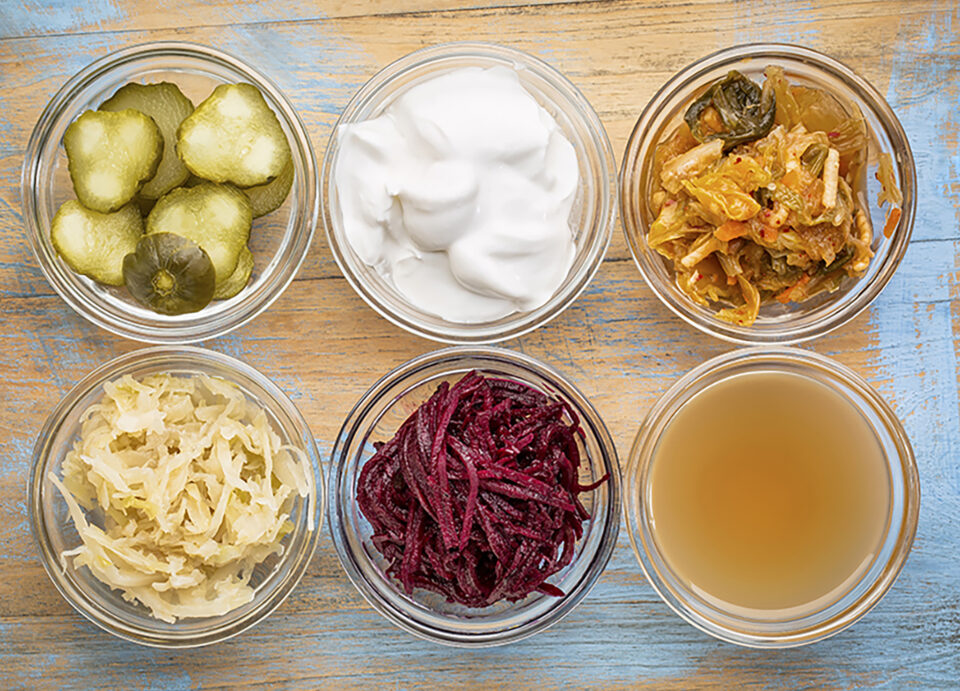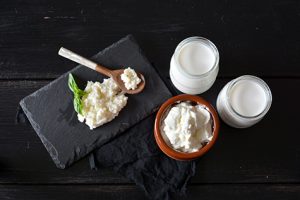Probiotics May Improve Your Quality of Life


Probiotics are trending as a hot topic this year because these good bacteria are gaining more scientific evidence that they support human health. Linked to aiding gut health and supporting good bacteria in the lower gastrointestinal (GI) tract, probiotic foods are growing in popularity. Read on to learn more about the role of probiotics in your health and how to include them in your diet today.
Probiotics are live organisms used to increase good bacteria in the lower gut. Common probiotics include lactobacillus, bifidobacteria, and saccharomyces which are all strains that can be found in a variety of foods you may already consume. Probiotic foods are trending in popularity in the modern diet though cultures around the world have used them for centuries. Probiotics are found in fermented dairy foods such as yogurt, kefir, and aged cheeses.
 Plenty of non-dairy foods are also rich sources including kimchi, sauerkraut, miso, tempeh, pickled foods, and cultured non-dairy yogurts. Keep in mind that not all varieties of these foods provide a probiotic source. Look for the words “active live cultures” on the label and purchase a refrigerated variety when at the grocery store. Fermented food companies are popping up, such as Firefly Kitchens, who specialize in making these types of products and have found that they may aid consumer’s stomach complaints.
Plenty of non-dairy foods are also rich sources including kimchi, sauerkraut, miso, tempeh, pickled foods, and cultured non-dairy yogurts. Keep in mind that not all varieties of these foods provide a probiotic source. Look for the words “active live cultures” on the label and purchase a refrigerated variety when at the grocery store. Fermented food companies are popping up, such as Firefly Kitchens, who specialize in making these types of products and have found that they may aid consumer’s stomach complaints.
There is research on probiotics both individually and collectively. Lactobacillus, Bacillus coagulans, Bifidobacteria, and Saccharomyces Cerevisiae and boulardii have evidence to support their benefit in the human diet. These probiotics are used for a variety of GI problems including abdominal pain, irritable bowel syndrome (IBS), inflammatory bowel disease such as Crohn’s disease and ulcerative colitis, constipation, small intestinal bacterial overgrowth (SIBO), and diarrhea.
Diarrhea and constipation are two of the most common reasons people take probiotics or eat probiotic foods. Analyses of clinical research suggest that probiotic treatment with Lactobacillus reduces the risk of antibiotic-associated diarrhea by 36% to 44%. This type of probiotic also has been shown to reduce diarrhea in travelers. Quantified by the number of living organisms in a given capsule, the strength of probiotics is called colony forming units (CFUs) which you will see on labels.
 Beyond improvements in stomach troubles, there are some other compelling reasons to include probiotics that affect other systems in the body. Research has shown that taking 2 billion CFU daily of Lactobacillus for 5 weeks could improve quality of life by almost 18% compared to placebo in adults with allergies to grass pollen despite treatment with drugs like loratadine. Research has also investigated the effects of Lactobacillus and other probiotics for treating symptoms of skin troubles like atopic dermatitis. Don’t think that only supplements will help; there is clinical evidence that consuming a yogurt product fermented with Lactobacillus can significantly decrease symptoms of diarrhea, stomach pain, and flatulence in people taking certain antibiotics.
Beyond improvements in stomach troubles, there are some other compelling reasons to include probiotics that affect other systems in the body. Research has shown that taking 2 billion CFU daily of Lactobacillus for 5 weeks could improve quality of life by almost 18% compared to placebo in adults with allergies to grass pollen despite treatment with drugs like loratadine. Research has also investigated the effects of Lactobacillus and other probiotics for treating symptoms of skin troubles like atopic dermatitis. Don’t think that only supplements will help; there is clinical evidence that consuming a yogurt product fermented with Lactobacillus can significantly decrease symptoms of diarrhea, stomach pain, and flatulence in people taking certain antibiotics.
Many people don’t realize that there are some drug-nutrient interactions with probiotics so use caution and seek a doctor or pharmacist approval before adding probiotics, particularly in supplement form, if you use immunosuppressant drugs, antibiotics, are having surgery on any part of your digestive system, are immune compromised or have short bowel syndrome. There is also some evidence for risk of fungaemia or infection in people receiving medications via catheter or immunosuppressed patients so again, use caution and speak with your provider if this is a concern for you. Research is mixed on probiotics partly because formulations and combinations tested vary widely. Probiotics as an ingredient in foods are generally recognized as safe (GRAS) while taking a supplement requires support and assessment from a medical specialist. Eating fermented foods can be a healthy and safe way to increase probiotics in your diet naturally.
Though there is more to learn in the future about probiotics, current research is promising concerning GI health, allergies, skin conditions, inflammation, the immune system and beyond. Eating fermented foods is a natural way to get probiotics that people around the world have used for centuries. Bonus: these types of foods are delicious and packed full of nutrients. How will you include probiotics in your diet today?
Resources:
Natural Medicines Database. Lactobacillus. https://naturalmedicines.therapeuticresearch.com/databases/food,-herbs-supplements/professional.aspx?productid=790. Updated 6/27/2016. Accessed 12/26/16.
Natural Medicines Database. Bacillus coagulans. https://naturalmedicines.therapeuticresearch.com/databases/food,-herbs-supplements/professional.aspx?productid=1185. Updated 6/15/2016. Accessed 12/26/16.
Natural Medicines Database. Saccharomyces. https://naturalmedicines.therapeuticresearch.com/databases/food,-herbs-supplements/professional.aspx?productid=332. Updated 2/16/2015. Accessed 12/26/16.
Natural Medicines Database. Yogurt. https://naturalmedicines.therapeuticresearch.com/databases/food,-herbs-supplements/professional.aspx?productid=829. Updated 2/16/2015. Accessed 10/21/2015.
Natural Medicines Database. Bifidobacteria
https://naturalmedicines.therapeuticresearch.com/databases/food,-herbs-supplements/professional.aspx?productid=891. Updated 2/13/2015. Accessed 12/26/16.
Academy of Nutrition and Dietetics. Prebiotics and Probiotics: Creating a Healthier You. http://www.eatright.org/resource/food/vitamins-and-supplements/nutrient-rich-foods/prebiotics-and-probiotics-the-dynamic-duo. Updated 10/10/16. Accessed 12/24/16.